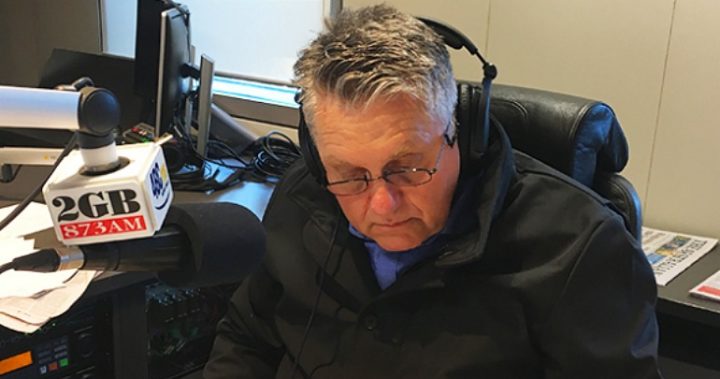Ray Hadley breaks silence on horror of speaking to Lindt Cafe siege hostages

Radio host Ray Hadley has spoken for the first time about the horrific moment he was phoned by “distressed” hostages caught in the Lindt Cafe siege in 2014 – describing the moment as “chilling and eerie”.
More than three years on from the shocking attack, the 63-year-old 2GB host has relived his own part in reporting on the siege live – and admitted it “left a mark” on him.
Lindt cafe manager Tori Johnson and barrister Katrina Dawson were killed after 18 people were taken hostage by gunman Mon Haron Monis in the chocolate store at Sydney’s Martin Place on December 15, 2014.
Ray stayed on air throughout the entire first day, in which time he was called by some of the hostages from inside the cafe as they relayed Monis’ demands directly to him.
The emotional radio host admitted he sought advice from the NSW Police Commissioner at the time, Andrew Scipione, as well as professional negotiators over what he should say.
Finally breaking his silence on the siege, Ray welcomed former Four Corners journalist Deborah Snow to his radio show to discuss her in-depth book about the day, titled Siege: Inside The Lindt Café.
Playing a series of radio clips from the day, Ray was initially heard saying: “I was just called out of the studio to talk to a very distressed young man who said he had been instructed to ring our switch. Switch put the call through to me, the man sounded very, very distressed, and said ‘I’m a hostage, the man holding us hostage has instructed police to move out of the area immediately. That’s rather chilling, it’s eerie.”
Read more: Partner still dreams Lindt Cafe siege victim will come home two years on
And speaking to Deborah about the impact it had on him he went on: “It seems like a lifetime ago. I don’t know how quite to say it.”
He paused live on air for a moment, clearly very emotional, before adding: “I didn’t realise until I started to read the book a week or two back that this had left a mark on me.
“And I’ve tried not to think about it over the past four years. But in reading your book, it’s so factual and so to the point, that I find myself reading small parts of it and then putting it down and coming back to it.”
Deborah immediately admitted she’d had a similar reaction from a lot of readers, and added: “There are scores, if not hundreds of people involved on that day and night – police officers, ambulance officers, family, friends, media professionals such as yourself and Chris Reason – who were profoundly affected and are affected in many ways, still to this day.
“I was conscious that I was writing about an event that was incredibly dramatic, had immense power as narrative, but was actually about real people and the impact on those lives.”
Ray spent around 10 hours on air that day covering the siege live, and said he remembers leaving the radio station and thinking the worst.
“My gut feeling was, when I left that night before at 6.15, that we would have complete carnage by the time I arrived back the next day,” he added. “By that time I knew who we were dealing with – a complete madman.”
The pair discussed a series of “shortcomings” by authorities on the day, including one officer admitting they should have stormed the building earlier than 17 hours after the siege began. However, they both admitted it’s difficult to guarantee a “better outcome”.
At one point, he recalled the moment police commissioner Scipione spoke to his “French counterpart”, who told him not to trust the media. However, the Frenchman later admitted they could learn from the Australian media – who had actually helped police throughout the day.
Of course just months later, the French media were under fire after several news outlets botched their coverage of the January 2015 Paris attacks by broadcasting the location of shoppers hiding from the gunmen in a Jewish grocery store.
The French police commissioner reportedly told Scipione: “We can learn from your situation here not to treat the media as hostile, but to let them help us”.
Ray was in contact with police throughout the day, relaying the demands and getting advice, and he said: “I remember Mr Skippy saying to me, whatever you do, don’t report his demands. I was given those demands by people inside the cafe.
“I remember saying to the team coming on after me ‘don’t stuff this up, we’re not about ratings here, we’re about getting people out of there alive’.
“I think all my colleagues in the media, on a tragic, tragic day, night and morning should be commended because I think most of them, if not all of them, acted with great responsibility in a crisis.”








 Proudly Australian owned and operated
Proudly Australian owned and operated